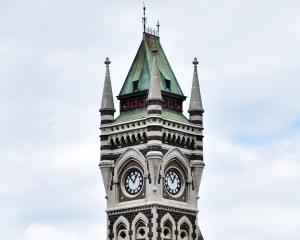
While face masks are an effective way of preventing the spread of infectious illnesses, the new study led by the university revealed people who wore a mask for about eight hours felt less happy, more tense and performed poorly when their focus was tested.
Co-author and Otago psychology researcher Associate Prof Liana Machado said masks had become a normal, often essential, part of people’s lives following the pandemic.

One of the concerns was masks would impair cognitive function.
"At the time, it was splashed all over the news bulletins, where people were very angry about having to wear masks.
"People were protesting on the streets but they were being told they must wear a mask, and they were concerned about potential negative effects.
"So we thought, ‘OK, let’s take a look and see if there is any detectable negative effects on brain functioning’."
Assoc Prof Machado said 42 university students, aged 18-36, took part in two identical laboratory sessions, one week apart.
Participants were required to wear a mask for about eight hours prior to, and throughout, one session and were maskless for the other.
During both sessions, their cognitive performance and mood were tested.
"During the mask session, participants reported feeling less happy and more tense, and they performed worse on a cognitive test designed to assess their ability to focus their attention and ignore distraction," she said.
"I think the very fact that you are wearing a mask and perhaps don’t find it overly comfortable, might make you feel a bit less happy and a bit more tense.
"In terms of the cognitive difficulties, that also seems to be driven — at least partly — by how anxious wearing the mask made them feel.
"Although it’s true that the effects may be driven by how much we dislike wearing a mask and feel uncomfortable, nonetheless there were some negative effects among the university students that we tested.
"But they were not life-threatening. We certainly did not find anything along those lines."
Assoc Prof Machado was surprised by the results, given university-aged students were generally "at their peak, developmentally".
"In terms of cognitive development, most people reach their peak abilities in their 20s, making typical university-aged students more resilient than most.
"The fact that participants struggled for one of the cognitive measures and were adversely impacted in terms of affect, makes us concerned for vulnerable populations such as older adults already struggling on a cognitive level, people suffering from depression or anxiety, and people with respiratory conditions.
"There could be some people who are a lot more sensitive to mask-wearing."
She believed those people would need extra support in the community and more understanding.
"If you at least had some awareness that wearing a mask could make you feel anxious or exacerbate some of the cognitive issues that you are already having, you could decide to limit how long you wear it — like go home for an hour or two and take it off.
"This allows you to make some informed decisions."
Assoc Prof Machado said dedicated research into the effects on vulnerable populations was a vital next step.












